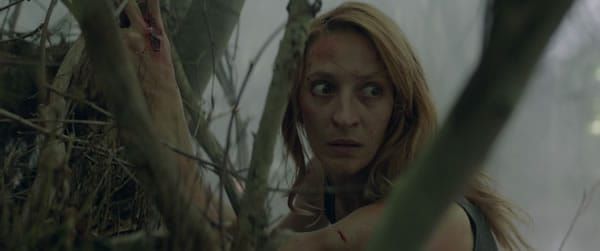Eye For Film >> Movies >> Av: The Hunt (2020) Film Review
Av: The Hunt
Reviewed by: Jennie Kermode

Turkey has always been a country caught between different worlds, the same accident of geography that ensures its prosperity making it the focus of countless wars. At its simplest, this might be seen as a struggle between Christianity and Islam, but scratch the surface and you'll find a much more complex and deep rooted cultural battle. Despite the increasingly religious bent of its current government, it's easy to get the impression that life in its larger cities functions pretty much the same way as life in the West, and for many people, it does. In smaller places, however, a much older set of values holds sway - and as so often around the world, the conflicts between these value systems are acted out on the bodies of women.
Ayse (Billur Melis Koç) has a lover. They meet in secret in a mostly empty flat. Their passion for one another is clear. It's a commonplace scene - it's probable that thousands of people around the world are engaged in such encounters at this very moment - but we know the moment we hear a knock on the door that Ayse's circumstances are different. When the violence starts, she has no option but to run. She has no money - not even a full set of clothes. There will be no sanctuary for her at home. The only hope she has is to make it to Istanbul - to her sister, perhaps, or at least the anonymity of the city - before her pursuers catch up with her.
Although Turkish law has explicitly condemned 'honour' killings since the revision of the Penal Code in 2005, and they attract sentences of life imprisonment, the power of tradition and many people's willingness to turn a blind eye means that they still claim the lives of around 200 women a year. What's more, even among people who would never condone killing, the belief that women are essentially the property of the male relatives and should be physically disciplined when they disobey remains common. The consequence of all this is the Ayse knows she can't trust strangers. She's on her own.
Through the simple act of showing us Ayse's far right from the start - along with her lover's attempts to defend her - director Emre Akay places viewers instinctively on her side, a choice that could have a real impact on how thousands of viewers think about women in such situations. The fact that we know next to nothing about her makes this approach even more powerful, as for a long time there's nothing for us to focus on except her desperation, her courage and the cleverness she has to employ in order to secure her escape. Once the chase moves into a maze of forest, caves and canyons, still more primal emotions come to the fore. Ayse is forced to run like an animal, but it's folly for her pursuers to think of her that way - to lose track of the threat that she too can pose.
The film slows down when we spend time with the hunters, but here Akay seems keen to make us think about the sort of men who think and act in this way. Their constant need to reaffirm their masculinity means that they may be as dangerous to one another as to their quarry. A teenager among their number is uncertain about the whole enterprise but finds himself constantly goaded about his failure to act like a real man. Along the way, he grows increasingly suspicious of the men's motives. Talk of rape doesn't suggest that this is about justice or restoring the family honour, as they proclaim. It also becomes clear that they're happy to ignore Islamic law when it inconveniences them.
Av: The Hunt is beautifully shot, capturing the varied landscapes of the region in a way that emphasises the bonds between the characters and their country, reminding us how much this place means despite the difficulties that living there presents. It also positions Ayse as someone who is just as much a part of this world as any of the men, somebody who has just as much right to be outside, alone - something that is culturally challenging itself in some areas. A scene in a cave attains a surreal quality because of the way the light is filtered, the way Akay's camera makes use of the shadows. one is reminded of Sixties science fiction adventure films. It's a surreal situation, one that neither Ayse nor her pursuers can fully come to terms with, even when it's a matter of life or death.
There's also a surreal quality to the ending, though here, sadly, the film doesn't hand together as well. When Akay uses some of the visual language he has previously employed in flashbacks in a different way, the result is distracting, creating uncertainty at the wrong time. This is the only significant problem, however, in an otherwise beautifully constructed film that will haunt you for a long time after the credits roll.
Reviewed on: 31 Aug 2020















